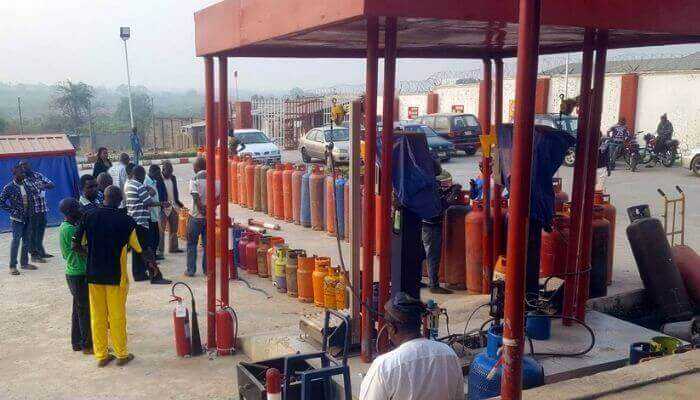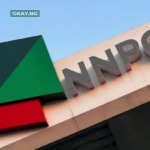Many Nigerians are grappling with a sudden rise in the price of cooking gas, with reports showing that a kilogram now costs as much as ₦2,000 in several parts of the country. The development has sparked nationwide concern among consumers who depend heavily on Liquefied Petroleum Gas (LPG) for daily cooking needs.
Gas marketers have explained that the current surge in prices is not a result of any official adjustment by the government but rather due to temporary supply disruptions and opportunistic market manipulation by certain operators. The National President of the Nigerian Association of Liquefied Petroleum Gas Marketers (NALPGAM), Oladapo Olatunbosun, made this known during an interview on The Morning Brief programme on Channels Television on Wednesday.
Olatunbosun clarified that there has been no official increase in the price of cooking gas, stating that some marketers are exploiting the shortfall in supply to make excess profits. He said, “I sympathise with Nigerians as the President of NALPGAM because we never intended to have a situation like this. I must say it categorically that prices of cooking gas have not gone up. No increment has been done officially. What is happening is that some marketers are taking advantage of the shortage in supply and the market forces that have increased demand. They are cashing up to make good money, which is wrong. We frown at this as an Association, and I’m happy that by the grace of God, normalcy will return in the next few days.”
According to Okay News reports, the price of LPG, which had previously been sold between ₦1,200 and ₦1,300 per kilogram, has now risen to ₦1,700 and ₦2,000 in some locations, and in rare cases, up to ₦3,000. This sharp rise has triggered anxiety among consumers, with many calling on the government to step in and address the situation.
Olatunbosun explained that the spike in prices was a temporary situation created by supply challenges that followed industrial actions within the oil and gas sector. He traced the problem to the Petroleum and Natural Gas Senior Staff Association of Nigeria (PENGASSAN) strike, which disrupted operations at the Dangote Refinery and affected loading schedules.
He said the issue began when Dangote Refinery, which had improved domestic gas supply by cutting off middlemen, went on maintenance. “Before the strike, when you load from Dangote, he sends out about 50 trucks per day, which is good because it served the South West and some part of the North well, and if you add it to what you get from Apapa, and other depots in Lagos, because they also source their products from International Oil Companies and other producers,” he explained.
“Dangote came in with his own strategy, selling directly to offtakers. That made importation not to be attractive. You won’t be able to compete if you import because you are likely to incur losses. But at a time, Dangote also commenced renovation/maintenance, which affected loading. Trucks started spending like 14 days at Dangote yard before they could get products. So, marketers switched to Apapa, and nobody felt the impact,” he added.
The NALPGAM president explained further that during the refinery maintenance, marketers depended on Apapa depots, but when the PENGASSAN strike started, it disrupted vessel discharges and inspections, drying up gas stocks. He continued, “When Dangote finished renovation, and we were about to commence full loading, the strike came in. Although Dangote didn’t stop production, everybody had rushed to Apapa, and it was now out of product, and all the depots there were dry. The only vessel that came in from NOJ axes was meant to supply three depots could not berth because of the strike. And even when it berthed, the officers to inspect it weren’t on the ground because of the strike, and that caused about five days’ loss, and the real impact of the backlog became obvious. Now that the strike is off, the product has been discharged, and they are trucking out. But because everywhere is dry and the South West is the only place that consumes the largest amount of LPG in Nigeria.”
Olatunbosun described the situation as artificial and assured that it would soon normalize as supply stabilizes. He noted that the backlog of deliveries had worsened the shortage, particularly in the South-West region, which consumes the largest volume of LPG in the country. He also revealed that national consumption had grown from 1.2 million metric tonnes three years ago to nearly two million metric tonnes, putting additional pressure on supply whenever disruptions occur.
He appealed to consumers to purchase gas directly from registered gas bottling plants to avoid overpaying. “If you buy a product from a third party, fourth party, the chain has been extended, then the price is going up, which is quite illegal. Just like you buy petrol on the road for people who carry kegs, they will sell it at exorbitant prices. So if you go to gas plants, the price you can buy today is 1,300 maximum,” he advised.
He added, “People who are claiming to buy gas at 1700 did not disclose the source of their purchase. If you are buying from a third or fourth party, then catch on, and the prices increase. But if you buy from gas bottling plants, my members, you will not buy as high as that. Average price within my members in Southwest today is between N1000 to maximum of N1300, depending on the location and the kind of overhead they incur to get the gas into the plant. Before this artificial scarcity, the prices were being sold at 1,050 in some places, N950. So the highest you could get from a gas plant today is N1300, depending on if it’s a very remote area.”
The NALPGAM president reaffirmed that the association was collaborating with relevant authorities to restore balance and ensure steady distribution. He expressed optimism that the gas supply crisis would ease within days, bringing relief to households struggling with high energy costs.







